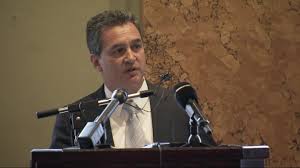By Andrew Warshaw
October 14 – Michael Garcia, whose report into possible corruption surrounding the 2018 and 2022 World Cup bids is dominating the football politics landscape, is back on the offensive, declaring that FIFA’s way of conducting its business is not open enough and needs a culture change.
Garcia, head of the investigative arm of FIFA’s ethics committee, has made no secret since submitting his report that the 430-page file should be made public, a view that has split opinion among the FIFA hierarchy and is not shared by Hans-Joachim Eckert, the German judge who will deliver verdicts into any wrongdoing.
Eckert and others have linked the investigation’s confidentiality with the protection of witnesses but Garcia has further fuelled the debate with remarks regarding the investigation process and FIFA’s reform programme in general.
“The investigation and adjudication process operates in most parts unseen and unheard,” the former US attorney was quoted as saying in a keynote speech at an event organised by the American Bar Association in London.
“That’s a kind of system which might be appropriate for an intelligence agency but not for an ethics compliance process in an international sports institution that serves the public and is the subject of intense public scrutiny. The natural next step of the development of an effective ethics process at FIFA is greater transparency.”
Garcia then issued a veiled attack on FIFA president Sepp Blatter which certainly won’t go down well at Blatter’s office in Zurich after his decision to stand for a fifth term of office next year.
“The second element that is vital to fulfilling the promise of this reform process is done at the top. More simply put … (what) FIFA needs in order to meet the challenge of ethics enforcement is leadership. An ethics committee – even a serious, independent ethics committee backed by a strong code of ethics – is not a silver bullet.
“What is required is leadership that sends a message that the rules apply to everyone; leadership that wants to understand and learn from any mistakes or missteps the ethics committee may have identified; leadership that makes it clear to everyone – this is what we’ve set up the ethics committee to do, this is why they do it, and this is what they’ve done.”
Garcia said that other sports organisations have shown greater willingness to put their houses in order, notably the International Olympic Committee after the 2002 Salt Lake City scandal.
“The value of transparency is evident from the experience of other sports organisations. Look at the IOC, where allegations concerning Salt Lake City [and its Winter Olympics bid] were addressed and published and the IOC moved forward.
“Without transparency, problems and scepticism have lingered. We’ve seen that recently with the NFL . . . which has had to bring in outside counsel to investigate its own investigation.
“It’s that kind of leadership that breathes the life into a code of ethics. Because true reform doesn’t come from rules or creating new committee structures. It comes from changing the culture of the organisation.”
Garcia said the aim of transparency was not “to embarrass certain individuals” or “harm the organisation”, but rather the opposite.
“It’s one thing to tell people that a rigorous process is in place. It’s another thing to show them how that process works and what it has uncovered,” he said. “FIFA built the system that should inspire confidence that things have changed for the better. Showing that to the public serves FIFA’s best interest.”
Contact the writer of this story at andrew.warshaw@insideworldfootball,com

